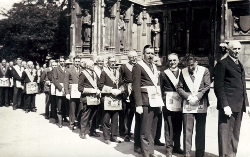- Are we attacking the symptoms of gun violence or true problems?
Click for AUDIO VERSION.
To use this segment in a Radio broadcast or Podcast, send TIM a request.
 We all suffered to some degree following the shootings in Parkland, Florida on Valentine's Day, particularly the High school students there. Their pain is legitimate, their solution to the problem is not. Any time we have a disaster like this, the Left likes to point fingers at assault weapons, the FBI, the NRA, and their favorite target, Mr. Trump. In other words, everyone but the shooter himself. This knee-jerk reaction is obviously done for political purposes and addresses merely the symptoms, not the root problem.
We all suffered to some degree following the shootings in Parkland, Florida on Valentine's Day, particularly the High school students there. Their pain is legitimate, their solution to the problem is not. Any time we have a disaster like this, the Left likes to point fingers at assault weapons, the FBI, the NRA, and their favorite target, Mr. Trump. In other words, everyone but the shooter himself. This knee-jerk reaction is obviously done for political purposes and addresses merely the symptoms, not the root problem.
Even if government banned the popular AR-15, there are many other rifles with similar capabilities, and if you were to ban them all, there are still semi-automatic shotguns which can do a lot of damage quickly, not to mention handguns. And if you were to ban all guns, there would be another weapon du jour, such as a road-side bomb, or simply a car ramming into a crowd.
Following the last Federal Assault Weapons Ban held from 1994-2004, the Department of Health and Human Services conducted a follow-up study and concluded, "the Task Force found insufficient evidence to determine the effectiveness of any of the firearms laws reviewed for preventing violence." In other words, the ban did nothing to reduce violent behavior.
The NRA is frequently criticized and portrayed by Democrats as the bogeyman of violence. As advocates of the Second Amendment, their support of gun safety, education, and animal conservation is conveniently overlooked. True, the NRA supports various politicians, just like many other lobbyists. Hampering their ability to make such donations should only be done with sweeping reform of all lobbyists, not just the NRA. Their vilification is just plain wrong.
There are three areas that need to be addressed:
1. Discipline & Education
The shooter in Parkland came from a broken home, which probably explains why he had trouble differentiating right from wrong. It is no secret the family unit has been deteriorating over the years. It is common for children today to be raised by a single adult who is usually overworked and too tired to manage their offspring properly, and there are others who simply abdicate their parental responsibilities and allow their children to find their own way through life, with the assistance of the Hollywood media. Not surprising, morality is on the decline in this country and shaping the character of our youth. I find it rather remarkable we do not take Hollywood to task for the wanton violence they promote.
Not surprising, I'm a proponent of teaching parenting skills as part of an adult education program, perhaps at the schools in the evenings.
Since parents appear unwilling or unable to teach proper behavior, perhaps some basic classes for the students in morality and common courtesy are in order.
Discipline and respect are in decline in schools. For example, consider this letter sent from a middle school Science teacher in Dunedin, Florida to his PTA following the Parkland incident:
"I am a science teacher here at DHMS and I wanted to share this information with you. This is the real problem; the system is broken to where we cannot do anything or exact any meaningful consequences for this type of student. This article I found today from the Miami Herald describes at least a dozen students here at our school. We write referrals, they might even get suspended for a day or two, but these 'nightmare' children return and terrorize our campus as soon as the consequence is served. Students that get reassigned to Pinellas Secondary School end up coming right back after a semester. The description of the student in the first paragraph (aside from bringing bullets) describes many students that never receive a consequence, or are categorized as 'Special Education', 'Emotionally/Behaviorally Disabled', and know that the school cannot do anything about their atrocious behavior. Before we attack people's 2nd Amendment Rights, we need to attack our legislators and School Board for forcing administrators to keep these dangerous students in our schools despite their repeated warning signs of violent tendencies. Until we can enact change to report and remove these students, these tragedies will continue. I have been physically assaulted by a student this very school year, pressed charges, and the student continues to walk the hallways and brag about who all he has 'beat up'. We spot these students early on, and dread their presence, but have absolutely no legal way to protect the rights of the rest of the population from these predators."
As corporal punishment is no longer allowed in schools as a deterrent for misbehavior, disciplining children is next to impossible, and without it, student grades are affected. To illustrate, ten years ago I wrote about Caroline Haynes, a school principal in Great Britain who caught the attention of the press when she started to implement strict discipline in the classroom. She is with the Tendring Technology College in Clacton-on-Sea, Essex, UK, a secondary school which, when translated to the American equivalent, is a private school for children ages 11-19. Her "zero tolerance" policy for misbehavior resulted in a school environment where students were freed to concentrate on their studies and, consequently, improved their grades significantly. I was told the students actually liked the discipline and preferred it over chaos. This is consistent with my contention that people tend to thrive in a structured environment which is well organized and leadership is strong, whether it is in school or in business.
There is also something to be said about implementing school dress codes to influence behavior. Such codes help to promote conformity and decorum. A local high school recently experimented with a "Professional Attire Day," meaning the students in the business program were asked to dress up for a day. Instead of t-shirts, shorts and gym shoes, they were asked to wear suit and ties for the men, and dresses for the ladies. Remarkably, the lion's share of students liked the change and took pride in looking their best. The students were questioned about their experience afterwards and reported they felt more positive and confident when dressed up as opposed to being dressed down. Interestingly, they appreciated the respect they received from their teachers regarding their appearance and deportment. The students comprehended the effect of a professional image, both at school and beyond. Some genuinely yearned for a better school dress code as opposed to the slovenly appearance which was currently the norm.
One last note regarding education, some time ago I wrote about my experience attending a concealed weapons class here in Florida. Other states have similar programs. In my case I was impressed with the professionalism and knowledge of the instructors, and felt this was something everyone should be exposed to. An informed public is less likely to become a victim and more likely to survive a shooting situation. Anyone who has attended such a class would probably agree, education is the key. Everyone from Middle School onward should be taught the lessons of gun safety. Even children in Elementary grades should learn some of the basics.
The only problem with these suggestions for education and discipline is they are considered socially unacceptable and, as such, will likely be spurned as opposed to embraced. Parents will probably not be inclined to learn new parenting techniques, claiming they haven't got the time. They also tend to oppose dress codes as they see it as inhibiting the creativity of the individual, and have no appreciation for the benefits of teamwork. And gun safety classes will be perceived as promoting violence, when in reality, it is just the opposite. This means, the parents and students do not want to put forth the effort to thwart school violence through such education and hope it can be stopped through other means, such as changes in the law. The only problem here though is you cannot legislate morality.
2. Review and revise our rules for obtaining guns.
Following Parkland, there was much discussion about raising the age of a person to own a gun. The argument here is that if a person can join the military at 18 and fight for his/her country, then 18 should be the age. The one difference though is that the military provides proper instruction in the handling of firearms, something others do not receive. Again, I am a proponent of gun safety classes. If a person can be certified, such as through an NRA class, they should know how to properly handle a firearm.
The most difficult aspect to ascertain is the mental stability of the individual, which was at the heart of the problem in Parkland and other shooting scenes. Here, students, teachers, parents, and shooting instructors should be trained in terms of looking for signs of trouble and how to report a problem. Again, it's a matter of education. In the case of the Parkland shooter, his social media was full of obnoxious references to shooting. This should have raised some red flags in the system. Unfortunately, it did not.
3. Fortification
The era of using schools as gun free zones is quickly coming to an end. Such zones embolden shooters as they realize they are soft targets. School perimeters need to be secured to eliminate unauthorized access. This was a significant problem at Parkland.
Training and arming school personnel should also be considered either using existing staff or hiring supplemental people to secure and defend the school campus.
Such measures as mentioned herein seem unimaginable to those of us who grew up in a different time when we respected our teachers, loved our school, and as such, had no need for school resource officers. But times have changed. Back in the early 1970's you could simply go to the airport, show your ticket to your flight attendant, hop on a plane and leave. You obviously cannot do this anymore as tight security is now required. The same is true in our schools, it is a new time and we can no longer afford to operate as we did forty years ago. Our social mores and morality have changed radically, making this a much more dangerous time for those attending our schools. It is time to improvise, adapt, and overcome just as we did in our airports.
Even if you implemented all these measures, including the abolition of guns completely, you are never going to solve the problem 100%. There will always be the issue of a social misfit or radicalized person waiting for an opportunity to seek violence. It's not about the choice of weapon, it's about the human being. It always has been, and always will be. It is not so much about what laws, rules and regulations we enact as it is about treating human frailties and maturity. Education, discipline, and a little common sense will go much further than banning guns altogether.
Let us stop attacking the symptoms, it is time to look in the mirror and address the true problem.
Keep the Faith!
Note: All trademarks both marked and unmarked belong to their respective companies.
 Tim Bryce is a writer and the Managing Director of M&JB Investment Company (M&JB) of Palm Harbor, Florida and has over 40 years of experience in the management consulting field. He can be reached at timb001@phmainstreet.com
Tim Bryce is a writer and the Managing Director of M&JB Investment Company (M&JB) of Palm Harbor, Florida and has over 40 years of experience in the management consulting field. He can be reached at timb001@phmainstreet.com
For Tim's columns, see: timbryce.com
Like the article? TELL A FRIEND.
Copyright © 2018 by Tim Bryce. All rights reserved.
Click for TIM'S LIBRARY OF AUDIO CLIPS.
 You do not see much in the way of cooperation these days. Socially and politically we cannot seem to get along any more. We see this in the office, in stores, and particularly in supermarkets where we are not mindful of others and hog the aisles to serve our own personal interests. I still believe painting a dashed line down the middle of the aisles would be an interesting experiment to see if people would keep their grocery carts on one side or the other.
You do not see much in the way of cooperation these days. Socially and politically we cannot seem to get along any more. We see this in the office, in stores, and particularly in supermarkets where we are not mindful of others and hog the aisles to serve our own personal interests. I still believe painting a dashed line down the middle of the aisles would be an interesting experiment to see if people would keep their grocery carts on one side or the other. I am convinced if you did everything people told you to do to maintain a healthy lifestyle you would never get anything done. For example, exercise consumes a lot of time, whether it is performed in your house or offsite at a gym. Since I elect to go to the gym, I find I must change clothes, travel to it's location, work out, return home, clean up and change clothes. No matter how I try to expedite the process, it's an easy hour shot.
I am convinced if you did everything people told you to do to maintain a healthy lifestyle you would never get anything done. For example, exercise consumes a lot of time, whether it is performed in your house or offsite at a gym. Since I elect to go to the gym, I find I must change clothes, travel to it's location, work out, return home, clean up and change clothes. No matter how I try to expedite the process, it's an easy hour shot. Freemasons have always been proud to boast, "We're the original fraternity," an acknowledgement of our roots in antiquity. Since then, many other fraternities have emerged, particularly in the nineteenth century, many of which are based on Masonic customs. Aside from college fraternities, there are the Eagles, the Elks, the Lions, the Moose, the Fraternal Order of Police (FOP), even the VFW shows signs of fraternal relations. These organizations may appear to be relative "upstarts" when compared to our ancient fraternity, but can they teach us anything?
Freemasons have always been proud to boast, "We're the original fraternity," an acknowledgement of our roots in antiquity. Since then, many other fraternities have emerged, particularly in the nineteenth century, many of which are based on Masonic customs. Aside from college fraternities, there are the Eagles, the Elks, the Lions, the Moose, the Fraternal Order of Police (FOP), even the VFW shows signs of fraternal relations. These organizations may appear to be relative "upstarts" when compared to our ancient fraternity, but can they teach us anything? Now is the time to safeguard the rights and freedoms penned by our founding fathers and valiantly defended by our sons and daughters in uniform.
Now is the time to safeguard the rights and freedoms penned by our founding fathers and valiantly defended by our sons and daughters in uniform. I wrote as a
I wrote as a  Let me say from the outset that the burden of responsibility for improving your skills in your chosen profession rests with YOU, not your employer. Your company may offer supplemental training but more than anything YOU are responsible for your development, not anyone else. YOU must take the initiative. In most cases, your company will assist you in your development, but YOU must demonstrate your willingness to learn and improve.
Let me say from the outset that the burden of responsibility for improving your skills in your chosen profession rests with YOU, not your employer. Your company may offer supplemental training but more than anything YOU are responsible for your development, not anyone else. YOU must take the initiative. In most cases, your company will assist you in your development, but YOU must demonstrate your willingness to learn and improve.